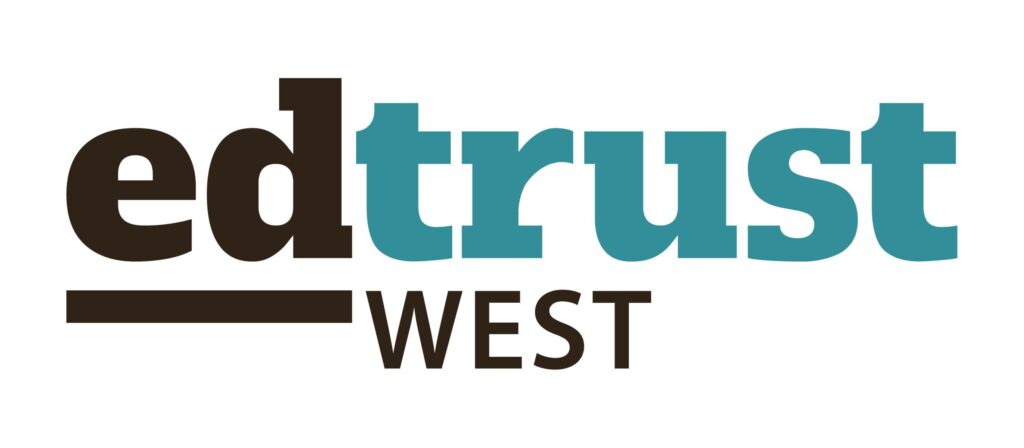When Beatriz Espinoza enrolled in her California Community College (CCC), she was placed in remedial English courses, which pushed back her timeline for transferring to a California State University (CSU). “I was kind of upset,” she recalls. “The remedial classes were everything I had already learned in high school… a waste of time.” Helen Yasko had a similar experience after being placed in remedial math. For her, the class represented a lack of confidence in her potential; each semester, she’d drop the class before it even started, not able to bring herself to attend a course that made her feel as though she wasn’t good enough.

Helen Yasko advocating for AB 705 implementation
Remedial courses (sometimes called developmental education or prerequisites) are non-credit-bearing coursework that students must complete before starting courses that count toward graduation. They’re supposed to ensure that students are fully prepared for credit-bearing coursework. Yet, they actually do just the opposite: only 16% of students in remedial courses earned a certificate or associate degree within six years, and only 24% transferred to a four-year university in CCC. Until recently, the CSU required 2,600 students to leave each year after not completing a remedial course in math, English, or both during their freshman year.
It’s a barrier to college success that Latinx (87%) and Black (87%) students are much more likely to face than their White (74%) and Asian (70%) counterparts in CCC. All racial/ethnic student groups are more likely to complete transferable gateway courses when placed directly into transfer-level courses instead of remedial courses.
The solution is obvious: eliminate remedial courses. Students who start directly in transfer-level courses instead of remedial courses are more likely to complete transfer-level coursework. This is true even if the student had a low GPA in high school.
In theory, no California student should be in Helen and Beatriz’s positions anymore. At the community college level, AB 705 prohibits a community college district or college from requiring students to enroll in remedial English or mathematics coursework unless evidence suggests they are highly unlikely to succeed in transferable, college-level courses and that enrolling in remedial coursework will improve their odds of completing. At the California State University, EO 1110 eliminated stand-alone developmental education prerequisites and calls for alternative instructional models to support students in credit-bearing courses. They each have game-changing potential–but only if actually implemented.
When AB 705 passed, I was the Program Coordinator with Students Making A Change (SMAC), working alongside Black and Brown community college students to explain these brand-new rights. We organized in front of the placement center to stop students from taking the placement test and enrolling in remedial courses. Instead, we informed students of their rights with AB 705 to be placed directly into transfer-level classes. It was heartwarming to see the students’ reactions, their faces filled with joy, smiling from ear to ear, and their arms opening to hug us.
But it shouldn’t be up to groups like SMAC. The onus is on colleges and universities to guarantee students their rights and ensure they have the smoothest path possible to graduation.
Reforms have passed, but the work is far from over. A new report by California Acceleration Project and Public Advocates finds that the implementation of AB 705 is profoundly inequitable: in Fall 2019, California Community Colleges still disproportionately enrolled Black and Latinx students in remedial math courses compared to their White and Asian peers.
The truth is remedial courses uphold low expectations, are a gatekeeping tactic, maintain structural racism, and are a driver of racial achievement gaps for Black and Latinx students. Dismantling the inequities produced by remedial courses requires educational systems to hold up a mirror, be honest, and execute a plan that will address the racial inequities perpetuated by remediation and close racial attainment gaps:
1. Eliminate remedial courses and require enrollment in gateway courses: State and campus leaders should work to eliminate remedial courses altogether. Remedial courses widen equity gaps in completion of Black and Latinx students. Keeping remedial courses provides too many opportunities for a student to be placed in one when the data tells us students are not benefitting.
Given current legislation and regulation, additional recommendations include:
2. By default, colleges should enroll students into transfer-level math and English courses with additional support if necessary: The California Community College Chancellor’s Office default placement rules which include direct enrollment into transfer-level courses in English, statistics/liberal arts mathematics, and BSTEM-based mathematics, are a great place to start. Establishing this as the default would alleviate the burden of students having to know their rights under AB 705 and then advocate for placement in transfer-level courses.
3. Replace English and math remedial courses with corequisite models and holistic student support: Corequisite models offer transfer-level courses to all, with additional support to those who need it. They include concurrent support courses, intrusive academic support services, extended instruction time, and other supports. One student I spoke with described the experience as supportive because it made her feel as though “they wanted us to succeed.”
4. Inform students of their rights and provide transparent data: AB 1805, a law following AB 705, states that for community colleges to receive funding for Student Equity and Achievement programs, the administration must inform students of their rights to access transfer-level coursework and of the multiple measures placement policies. However, research by Just Equations finds college and university websites lack transparency and misdirect students towards remedial math classes. Students have a right to be informed of data on success and completion (when starting in a remedial class, starting in a transfer-level class, and starting in a transfer-level class with paired corequisite support). Communication and information to students of their rights need to be strengthened by publishing transparent data and taking accountability to close racial equity and racial attainment gaps.
The implementation of AB 705 and EO 1110 allowed Helen to bypass the remedial math class. Instead, she enrolled in a transfer-level statistics class and passed, proving she never needed to be in remedial classes after all. She’s now only one semester away from earning her Bachelor’s at San Francisco State. Beatriz made it through her remedial English class and then she advocated for AB 705 implementation to ensure that no one had to do the same. She’s looking forward to graduating in one year with her Bachelor’s degree in Chicano Studies and Sociology.
How many more students like Helen and Beatriz are held back by a class they don’t need and don’t know they aren’t required to take? It’s time we ensure the answer is zero. We all have a part to play in ridding higher education of the inequities caused by remedial courses in California. Two things you can do:
- Advocates can attend the next CCC Board of Governors meeting and CSU Board of Trustees Meeting to get informed and provide public comment on the need for equitable implementation of AB 705 and EO 1110.
- Students can connect with their CSU and CCC governing student body about this issue. They can also visit ab705.org a student-focused website to learn more and receive support with being placed into gateway transferable courses.
Denise Castro is the Policy Analyst at the EdTrust–West. Before joining The EdTrust—West, Denise was the Program Coordinator for Students Making A Change (SMAC). Denise supervised SMAC’s fellowship program, developed the leadership of students of color, managed policy and advocacy efforts, and monitored campaign goals to institutionalize equity in California Community Colleges. As a daughter of immigrant parents from Mexico and being the first in her family to graduate college, Denise is passionate about educational equity and racial justice. Denise holds a B.A. in Psychology and an M.A. in Sociology from the University of California, Merced.


